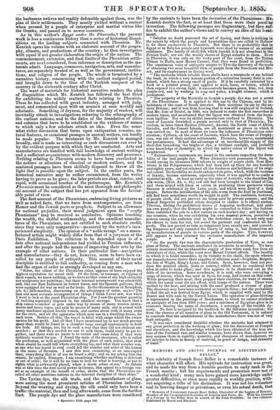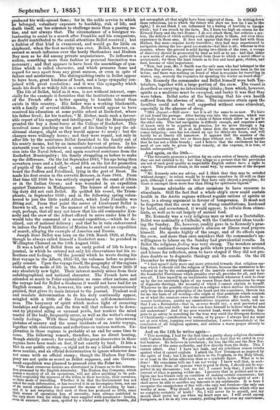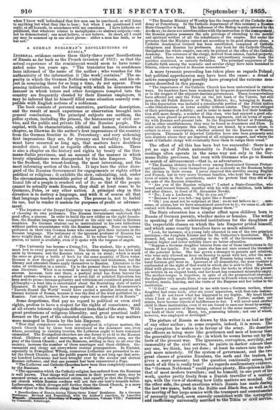MEMOIRS AND ARCTIC JOURNAL OF LIEUTENANT
BELLOT.* DIE celebrity of Joseph Rene Bella is a remarkable instance of what character will effect. His aptitude for instruction was great, and he made his way from a humble position to early rank in the French marine ; but his acquirements and promotion were not of a wonderful kind ; many men have gained more knowledge under greater difficulties, or risen more rapidly in worldly position, with- out acquiring a tithe of his distinction. It was not his volunteer zeal in braving danger or privations, or even his actual death, that
• Memoirs of Lieutenant Joseph Rend Bella, Chevalier of the Legion of Honour. Member of the Geographical Societies of London and Paris, &c. With his Journal of a Voyage in the Polar Seas in search of Sir John Franklin. In two volumes. Published by Hurst and Blackett.
produced his wide-spread fame ; for in the noble service to which be belonged, voluntary exposure to hardship, risk of life, and death itself, are too common to challenge more than a passing no- the, and not always that. The
i circumstance of a foreigner vo- lunteering to assist n a search after Franklin and his companions, no doubt contributed to the social attentions Bellof received ; but a fashion of that kind is evanescent, and would go for little on shipboard, when the first novelty was over Bellot, however, ex- ercised as much influence over the hardy Shetlanders and Hudson Bay men as he did among private acquaintance. To influence a nation, something more than fashion or personal fascination was necessary ; and that appears to have been the assemblage of qua- lities which is called character, and which procures fame and regard for men apart from any great success, or even in spite of failure and misfortune. The distinguishing traits in Bella appear to have been, great kindness of heart, and a large sympathy con- joined with great resolution; and it was this sympathy which made his death so widely felt as a common loss.
The life of Bellot, brief as it was, is not without interest, espe- cially for the example it furnishes that the institutions or manners of the French offer a better opening to humble talent than exists in this country. His father was a working blacksmith, with a family of several children. Bella would appear to have received his education at some public school at Rochefort, where his father lived; for his teacher, "M. Richer, made such a favour- able report of his capacity and intelligence," that the Municipality granted the boy a emi-burse at the College of Rochefort. This involved some pinching on the part of his family to pay the ad- ditional charges slight as they would appear to many : but the charges were willingly borne ; and they were repaid, not only in after life by the assistance Bellot furnished to his family out of his scanty means but by an immediate harvest of prizes. In his sixteenth year he underwent a successful examination for admis- sion into the Naval School, and again received assistance from the B,ochefort Municipality ; his family struggling as before to make up-the difference. On the 1st September 1843, "his age being then seventeen years and a half, he stood fifth on the list for promotion of pupils of the second class "; and was received successively on board the Suffren and Friedland, lying in the port of Brest. He made his first cruise in the corvette Berceau, in June 1844. From that time till 1850 he was actively engaged on the coast of Africa or in the Indian Ocean ; and was wounded in an expedition against Tamatave in Madagascar. The leisure of shore or coast- ing duty did not suit Bellot. He quitted his vessel, the Triom- phante, in September 1850; and in the following spring volun- teered to join the little yacht Albert, which Lady Franklin was fitting out. From that point the career of Lieutenant Bellot is known to all, as well as the manner of his untimely death; ex- cept, perhaps, that all may not know that his old commander Ken- nedy and the crew of the Albert offered to serve under him if he would take the command of a second expedition,—which he de- clined, out of national delicacy ; and that he in vain endeavoured to induce the French Minister of Marine to send out an expedition of search, alleging the example of America and Russia.
Joseph Rene Bellot was born on the 18th March 1826, at Paris, though he always called himself a Rochefort man: he perished in Wellington Channel on the 15th August 1853.
It was a habit of Bellot from an early period of life to keep a journal, in which he entered not only his observations but his re- flections and feelings. Of the journal which he wrote during his first voyage in the Albert, 1851-'52, the volumes before us princi- pally consist. -Upon the voyage itself, the geography of the regions visited, or the mode of life in the Arctic Seas, they throw little if any absolutely new light. Their interest mainly arises from their autobiographical and .national character. The French have not attended so much to Polar exploration as some other nations, and the voyage had for Bella a freshness it would not have had for an English seaman. It is, however, his own portrait, unconsciously painted, that gives its main interest to the journal. Prudent zeal and resolute determination to do his duty continually appear, mingled with a little of the Frenchman's self-demonstrative- ness. The buoyancy of spirit which makes light of recurring hardships and dangers, and the firm will that refuses to be down- cast by physical ailing or unusual perils, but renders the mind master of the body, frequently occur, as well as the writer's strong family feelings. With these biographical traits are interwoven pictures of scenery and the usual incidents of an Arctic voyage, together with observations and reflections on various matters. Ex- ploration in those regions is probably at an end for some time to come. The following remark, therefore, has no direct bearing, though strictly correct ; for nearly all the great discoveries in those regions have been made on foot, if not exactly by land. It hits a blot in our public system,—a rigid not to say a blind adherence to mere routine, and an official determination to ignore whatever does not come with an official stamp ; though the Hudson Bay Com- pany are not quite so secret as Bellot supposes, and one Govern. meat expedition was planned to proceed over the Polar ice.
"The most erroneous notions are entertained in France as to the informa- tion possessed by the English Admiralty. The Hudson Bay Company, which makes a mystery of all its operations will cot allow anything to be pub-
lished respecting the manners of the operations, in their territory, their resources, or their mode of travelling. Whether it be that the Government has not asked for such information, or has received it in an incomplete form, not one of its naval expeditions has possessed the means of travelling by land ; and it is not surprising that each of them has produced so little, since their season of operations has, of necessity, been always restricted to the very short time for which they were supplied with necessaries : besides, even in summer, their men, spoiled by a winter passed by the fireside, Aid
not accomplish all that might have been expected of them. In 'Writing down these reflections, (as to which the future will show me how far I am in the right) I do not think I am influenced by a feeling of hostility to foreign
rivals; I am struck by the facts. No, I bare too high an esteem for Sir Edwar Parry and the two Bosses : I do not attack them, but criticize a sys- tem, the defects of which nothing could make plain to them, not even their experience in these seas. It does not appear that they ever bad with them Hudson Bay men—regular Arctic travellers ; they had men experienced la navigation among the ice—good ice-masters—but that is all; whereas in thin country, where the ground is solid during two-thirds of the year, a voyage of discovery should be prosecuted by land as well as by sea : and that infers a new series of studies, quite different from those to which a naval officeris accustomed ; for them the least details as to foot and head gear, clothes, and food, become of vital importance. ' "Now, last year, Mr. J. Smith was the only man who had belonged to the Hudson Bay service ; the greater part of the crew had never been in the ilN) before, and there was nothing on board of what is requisite for travelling in winter, nay, scarcely the requisites for spending the winter on board ship."
I Mr. Kennedy the commander and Bellot himself were both Tee- ; totallers, together with a large portion of the crew. The vessel is described as carrying no intoxicating drinks ; from which, however, ' spirits as a medicine must be excepted, and lucky it was that they were taken. Bellot notes at the beginning that his own health suffered from the absence of wine. The excessive strain upon the faculties could not be well supported without some stimulant, especially in the absence of sleep.
"20th Auguat.—Still snow : but it is all the same to us now. We have at last found the passage. After having run into the entrance, which was but badly marked, we came upon a chain of flakes which allow us to get to the other side. This last navigation is difficult enough, and requires a Dort of knack only to be acquired by practice, for we move through a fog thickened with snow. It is at such times that the ice-master's duty be- comes fatiguing : ours has not closed an eye for thirty-six hours, and will hardly be at liberty till tomorrow. It appears that the masters of the whalers sometimes pass two or three days without rest. Mr. Leask regrets that he has not a little brandy ; and I believe that the excitement he has need of can only be given by that remedy, at the expense, it is true, of health subsequently."
And again, on the 28th-
" The forecastle presents a petition for an extra ration of brandy, although they are not entitled to it; but they allege as a pretext that the provisions are not of such good quality as respectable English sailors have a right to expect This petition closes, in the usual way, by assurances of the deepest respect. • Mr. Kennedy asks my advice and I think that they may. be satisfied without danger : to refuse would to expose ourselves to on their part, although I am convinced that they have only obeyed a prejudice; for there is amongst them more fear than liking for spirituous liquors."
It became advisable on other occadons to have recourse to stimulants. Still the fact that a whole ship's crew could sustain health in the Arctic regions without regular rations of spirits er beer, is a strong argument in favour of temperance. It must not be forgotten that the crew were of strong constitutions, hardenedi by habit, and accustomed, it would appear, to refrain from stimu- lants, as well as to eat largely of animal food.
Mr. 'Kennedy was a very religious man as well as a Teetotaller. Bellot was nominally a Catholic, with the Continental ideas touch- ing the Sunday. He, however, readily gave in to Kennedy's prac- tice, and during the commander's absence or illness read prayers himself. He speaks highly of the usage, and of its effects upon the crew, and more than once considers that the commander's un- willingness to labour on the Sunday had providential result. In Bellot the religious feeling was very, strong. The wonders around him, the continual escapes from perils where prudence was useless, and leisure for reflection, seem to have shaped if they did not pro- duce doubts as to dogmatic theology and its creeds. On the 2d
December he writes thus-
" I find myself daily more and more attracted towards that religious sys- tem which I should call the religion of Nature, because the sentiment is de- veloped in me by the contemplation of the marvels scattered around us by the wonderful Providence which presides over all, provides for all, and fore- sees all. I lose myself in an inextricable labyrinth whenever I seek to clear up by the too uncertain lights of my reason those dark mysterious by-ways of dogmatic theology, the necessity of which I cannot explain to myself. Whatever be the possible objections to a religion which derives its doctrines only from the innate principles of the heart and the conscience, therein lies for me the basis of all worship—the origin of that gratitude which reminds us of what the creature owes to the universal Creator. My doubts and in- cessant hesitations, amidst my conscientious inquiries after truth, tell me
i that I am a Rationalist—that s, as sonic would say, a soul perverted and opposed to the real faith : but who can force himself to believe what he rides not understand ? And if my poor wearied head, worn with anxiety, hap- pens to go astray in searching for the true way amid the divergent doctrines of Christianity—justification by works, or by grace- I always find my mind set at rest when, jumping over intermediaries, I arrive immediately at the conclusion of all religious systems, and address a warm prayer directly to God himself."
And on the 11th he writes again-
" This morning, I had for the first time a pretty sharp religious discussion with Captain Kennedy. We plied each other so hard that we ended in very bad humour. He believes in revelation' for him the Old and the New Tes- tament are of the same authority, and flow directly from the Deity. This I cannot admit. Alas! I have not faith, and my rebellious reason revolts against what it cannot explain. 1 admit the New Testament as inspired by the spirit of God; but I do not believe in the Prophets, in the Holy Ghoet, or at least in the latter otherwise than as a symbolic figure. What is to be done ? My conscience tells me I am not wrong : I know well that, in seek- ing to extract from all systems what is good in them, I should not be sup- ported in my discussions ; but, ma foil I cannot help that; I yield to tie current of whet is passing within me. I perceive that in politics and in re- ligion one has friends only on condition of making certain concessions, but what I have not, never shall have, nor wish to have, is the spirit of sect: I shall never be able to sacrifice my interests to my sentiments. It is here I recognize the omnipotence of free will—the only real freedom—the only one worthy of man. Why should I attach myself to doctrines which offer we no complete certainty of truth? No, I will never lie to myself,. and my mouth shall never say yes when my heart says no. I will avoid among foreigners, as I do in my own country, putting forward even my convictions,
when I know well beforehand that few men can be convinced, or will listen to anything but what they like to hear; but when I am questioned I will reply, at all hazards in accordancewith my conscience. I have hitherto ex- perienced, that whatever relates to metaphysics—to abstract subjects—can- not be demonstrated ; one must believe, or not believe. In short., all I could say may be summed up in one short phrase: either a man has faith, or he haa not."




























 Previous page
Previous page